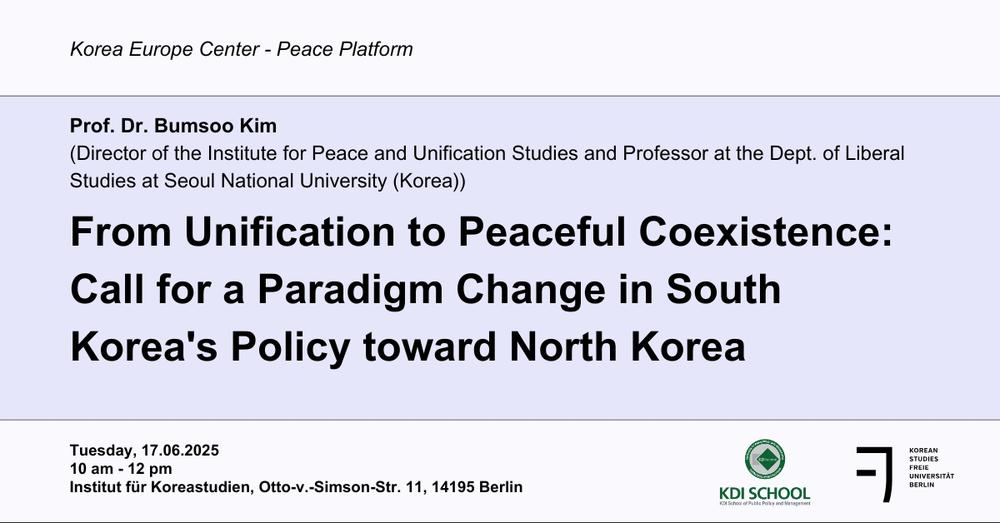From Unification to Peaceful Coexistence: Call for a Paradigm Change in South Korea's Policy toward North Korea
Prof. Dr. Bumsoo Kim
(Director of the Institute for Peace and Unification Studies and Professor at the Dept. of Liberal Studies at Seoul National University (Korea))
Lecture
This lecture examines the ROK’s policy toward North Korea and calls for a paradigm shift in the ROK’s North Korea policy—from unification to peaceful coexistence. Since the division of the Korean Peninsula in 1948, unification has been considered the ultimate goal of the ROK’s policy toward North Korea. For instance, the Syngman Rhee government advocated for the “unification of the Korean Peninsula by military attack on North Korea,” denying North Korea’s statehood and legitimacy. It argued that “the ROK government is the only legitimate and lawful government on the Korean Peninsula recognized by the United Nations (UN).” From Syngman Rhee’s perspective, North Korea was merely a rogue regime that had illegally occupied territory belonging to the ROK, as defined in the Constitution as including “the Korean Peninsula and its adjacent islands.” In this context, North Korean territory was seen as an area that the ROK would eventually reclaim and unify by absorption.
This official stance of the Syngman Rhee government has been consistently upheld by successive governments, even to this day. Despite numerous constitutional amendments and regime changes, the current Constitution—amended in October 1987—not only retains the territorial provision (Article 3), which states that “the territory of the Republic of Korea shall consist of the Korean Peninsula and its adjacent islands,” but also newly added Article 4, stating that “the Republic of Korea shall seek unification and shall formulate and carry out a policy of peaceful unification based on the principles of freedom and democracy.” This makes it clear that unification is a constitutional value to which the Republic of Korea should aspire.
These days, however, negative perceptions regarding the necessity of unification are rapidly increasing in South Korea. Moreover, in December 2023, North Korean leader Kim Jong-un announced that relations between South and North Korea are no longer those of kindred nations, but rather hostile relations between two states at war, and declared that unification is no longer a national goal of the DPRK. Under these circumstances, this lecture calls for a paradigm shift and argues that peaceful coexistence should take precedence over unification in the ROK’s policy toward North Korea.
About the lecture
Professor Bumsoo Kim received his B.A. and M.A. from the Department of International Relations at Seoul National University in 1992 and 1997 respectively, and his Ph.D. in Political Science from the University of Chicago in 2006. Since then, he has worked as a research professor in the BK Program of the Department of Political Science at Seoul National University and as a lecturer at Seoul National University, and since 2010, has been a professor in the College of Liberal Studies (CLS) at Seoul National University. In the College of Liberal Studies, he served as an associate dean twice (2012-2014 and 2017-2019), and since February 2023, has been serving as a Dean. At the Institute for Peace and Unification Studies (IPUS), he served as a chief of External Relations Division, head of the Center for Unification Studies, and deputy director from 2016 to 2023, and since March 2023 has been serving as a director. He has also served as a researcher at the Institute of Social Sciences at the University of Tokyo and a visiting professor at the University of Washington, U.S.A. He has served as a vice president of the Korean Political Science Association, a research board member of the Korean Association of International Studies, a president of the Governance Research Association, and a consultant for university restructuring at the Ministry of Education. As of March 2023, he is a member of the Academic Council of Seoul National University and an advisory board member of the Overseas Koreans Foundation.
His main research interests include political theory such as theory of justice and freedom, human rights theory, peace theory, nationalism, and multiculturalism. He has published many books in Korean, including What Is Fairness in Korean Society: 7 Theories of Justice to Protect a Fair Me (Akanet, 2022); What Is Peace Studies: Genealogy and Issues (Seoul National University Press, 2022); Korea-Japan Relations: Beyond Conflict to Reconciliation (Parkmun Press, 2021). He has also published many articles in peer-reviewed journals, which include “Bringing Class Back In: The Changing Basis of Inequality and the Korean Minority in Japan,” Ethnic and Racial Studies, 31(5), 2008, pp. 871-898; “Are North Korean Compatriots ‘Korean’? The Trifurcation of Ethnic Nationalism in South Korea during the Syngman Rhee Era (1948-1960),” Journal of Korean Studies, 24(1), 2019, pp. 149~171; “Are the Freedom of States and International Public Laws Compatible? Kant’s Theory of Peace and the Freedom of States” Korean Journal of International Relations, 59(3), 2019, pp. 7-54. In 2009, he received the Best Article Award of the Korean Political Science Association for his article “Who Is Japanese? the Boundaries of the ‘Japanese’ in Post-War Japan,” published in Journal of the Korean Political Science Association, 43(1), pp. 177-202.
Zeit & Ort
17.06.2025 | 10:00 - 12:00
Otto-v.-Simson Str. 11, 14195 Berlin
Weitere Informationen
Gwendolyn Domning - g.domning [at] fu-berlin.de

